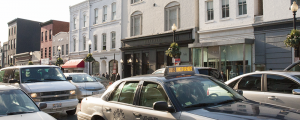
Vice President for Government Relations and Community Engagement Chris Murphy and professor Uwe Brandes will lead Georgetown’s partnership with the White House MetroLab Network, which aims to connect university research with local city leaders nationwide.
Georgetown partnered with the White House Smart Cities Initiative on Sept. 14, joining the MetroLab Network, a program that aims to promote university and city collaboration across the nation.
The White House Office of Science and Technology launched the MetroLab Network during the White House Smart Cities Forum. Twenty-eight universities in 21 cities have joined the network, which includes The George Washington University and Howard University, although no specific projects for Georgetown have been planned yet.
Vice President for Government Relations and Community Engagement Chris Murphy said the initiative is still in its early stages.
“Part of the key is that it is very early in the formation of the project,” Murphy said. “We are very much looking forward to working with the city and figuring out where the overlap is between the city’s needs and the university’s areas to contribute.”
Murphy said that as both cities and universities are constantly evolving, they are looking to data analysis to identify potential improvements.
“I think it’s only natural that the city would want to partner with us to help achieve their goals and give Georgetown an opportunity to flex its muscles with data analysis,” Murphy said. “Georgetown has been having conversations about gathering and analyzing data for a long time, and this is an opportunity to partner with the city in a more structured way.”
The entire White House initiative, which includes the MetroLab Network, is a $160 million investment in federal research addressing urban issues regarding economic growth, health, safety and energy.
The MetroLab program is particularly focused on improving infrastructure, city services and other areas of the public sector through university-city collaboration, according to the MetroLab Network website.
“The Network will focus on common challenges facing cities in order to develop shared, scalable solutions that can be deployed across the network,” the website reads.
Uwe Brandes, professor and the executive director of the master’s program in urban and regional planning, will lead the university’s involvement in the initiative once plans begin to take shape.
Brandes explained that part of the university’s research will focus on information technologies and how they are changing collaboration with city governments.
“At its core it involves using new sources of information in a tactile manner,” Brandes said. “It means asking: How do communities advance their goals and agendas though the new wave of digitally generated information?”
He added that although the program is still in an early developmental stage, it will build on Georgetown’s relationship with the greater
D.C. area.
“It is an opportunity to make new connections between undergraduates, graduates and faculty members, both with our colleagues at other universities and with the city,” Brandes said. “This isn’t the creation of an entirely new initiative within Georgetown. It will connect with other activities already occurring at the university.”
Murphy added that the partnership is an opportunity for Georgetown to become more involved with the movement toward addressing key urban challenges.
“As the project develops, we will have a better sense about how faculty and students can be engaged,” Murphy said. “This is an opportunity to directly plug into the city’s priorities in a meaningful way. Cities are grappling with how to use the data they have and how to analyze and think about data differently. D.C. has the opportunity to be at the forefront of this movement that is undoubtedly going to spread throughout the country.”
Brandes said that the involvement of city and university partnerships in the initiative distinguishes the program from conventional research and the broader “big data” conversation.
“Part of the effort is to bring more academic discipline to a dialogue that is largely being had outside the university,” Brandes said. “The goal for the partnership is to bring like-minded individuals together and advance the state of applied research in the field. It is a big work in progress, and now marks that time where we are beginning to roll up our sleeves and define what this really is.”




















